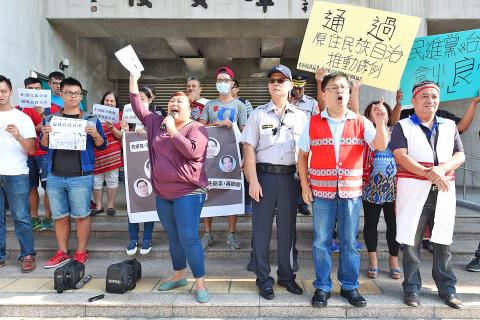Proposed self-government legislation for Aboriginal groups drew competing protests from Aboriginal activists yesterday.
Protesters from the Indigenous Youth Front faced off against a smaller group of older Aboriginal representatives led by a Chinese Nationalist Party (KMT) county councilor outside the Legislative Yuan.
The demonstrators shouted competing slogans before laying out their contrasting positions on the adequacy of the “Indigenous Self-Rule Temporary Regulations” (原住民族自治暫行條例) under consideration by the legislature.

Photo: Liao Chen-huei, Taipei Times
Indigenous Youth Front protesters said that the bill would only allow for “bird cage” self-government, which they described as “crippled” and “fake.”
“This is not self-government — it is the functions of the Council of Indigenous Peoples being outsourced to villages,” Front member Savungaz Valincinan said, criticizing the law’s focus on culture and education, while failing to protect hunting rights and allow Aborigines to draft their own criminal and civil law.
“What self-rule should look like should be discussed and determined by villages,” she said. “Right now, the executive branch has pegged us into their pre-prepared frame.”
Valincinan said that the representative electoral system of government prescribed by the act would not square with the customs of all Aborigines, citing the example of the Amis, who she said traditionally divide different tribal responsibilities based on age.
In contrast to the act’s emphasis on adversarial majority rule, many Aboriginal communities favor a “collegial system” focusing on achieving an absolute consensus on major decisions, she said.
Front member Juan Chun-ta (阮俊達) said that the funding provided under the act was inadequate.
The budget for the “self-governments” to be established would be allocated directly by the Executive Yuan for the next 10 years, after which a “Self-Government Fund” worth NT$10 billion (US$306 million) would be established to fund future expenses.
“That figure is extremely small,” he said. “There is no way you can do much with that amount of revenue.”
He said that the annual budget of the Council of Indigenous Peoples is more than NT$8 billion, while the yearly budget of Chiayi City is NT$11 billion, even though its population is less than half of the nation’s Aborigines.
A group of older protesters led by KMT Hsinchu County Councilor Obay a Awi (趙一先) said that the bill would be a beginning that could lay the foundation for more substantial self-government.
Obay said that the bill was intended to help Aborigines learn the “basic motions” of self-government, rather than establishing the final framework.
He said that it would provide a source of legal authority for existing Aboriginal assemblies, while allowing their members to focus full time on drafting and discussing permanent self-government proposals.
He added that while he did not disagree with the competing protesters’ desire for broader self-government than that contained in the draft bill, he felt that their opposition was not “prudent” because there is no guarantee that a more far-reaching bill would pass if the current one were rejected.

Taipei, New Taipei City, Keelung and Taoyuan would issue a decision at 8pm on whether to cancel work and school tomorrow due to forecasted heavy rain, Keelung Mayor Hsieh Kuo-liang (謝國樑) said today. Hsieh told reporters that absent some pressing reason, the four northern cities would announce the decision jointly at 8pm. Keelung is expected to receive between 300mm and 490mm of rain in the period from 2pm today through 2pm tomorrow, Central Weather Administration data showed. Keelung City Government regulations stipulate that school and work can be canceled if rain totals in mountainous or low-elevation areas are forecast to exceed 350mm in

EVA Airways president Sun Chia-ming (孫嘉明) and other senior executives yesterday bowed in apology over the death of a flight attendant, saying the company has begun improving its health-reporting, review and work coordination mechanisms. “We promise to handle this matter with the utmost responsibility to ensure safer and healthier working conditions for all EVA Air employees,” Sun said. The flight attendant, a woman surnamed Sun (孫), died on Friday last week of undisclosed causes shortly after returning from a work assignment in Milan, Italy, the airline said. Chinese-language media reported that the woman fell ill working on a Taipei-to-Milan flight on Sept. 22

COUNTERMEASURE: Taiwan was to implement controls for 47 tech products bound for South Africa after the latter downgraded and renamed Taipei’s ‘de facto’ offices The Ministry of Foreign Affairs is still reviewing a new agreement proposed by the South African government last month to regulate the status of reciprocal representative offices, Minister of Foreign Affairs Lin Chia-lung (林佳龍) said yesterday. Asked about the latest developments in a year-long controversy over Taiwan’s de facto representative office in South Africa, Lin during a legislative session said that the ministry was consulting with legal experts on the proposed new agreement. While the new proposal offers Taiwan greater flexibility, the ministry does not find it acceptable, Lin said without elaborating. The ministry is still open to resuming retaliatory measures against South

1.4nm WAFERS: While TSMC is gearing up to expand its overseas production, it would also continue to invest in Taiwan, company chairman and CEO C.C. Wei said Taiwan Semiconductor Manufacturing Co (TSMC) has applied for permission to construct a new plant in the Central Taiwan Science Park (中部科學園區), which it would use for the production of new high-speed wafers, the National Science and Technology Council said yesterday. The council, which supervises three major science parks in Taiwan, confirmed that the Central Taiwan Science Park Bureau had received an application on Friday from TSMC, the world’s largest contract chipmaker, to commence work on the new A14 fab. A14 technology, a 1.4 nanometer (nm) process, is designed to drive artificial intelligence transformation by enabling faster computing and greater power